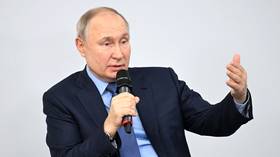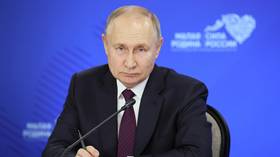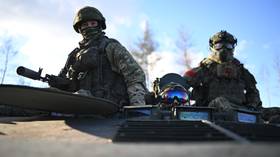Ukraine conflict was inevitable after 2008 – Putin

The West provoked the ongoing conflict between Russia and Ukraine by luring Kiev with the prospect of NATO membership. This move drastically changed the security situation on the continent, President Vladimir Putin said on Tuesday. The current standoff began not in 2022 but in 2008, he added, speaking to local community leaders from across Russia.
Putin then cited a former Czech president, who has “recently” admitted that the “war” between Kiev and Moscow started in summer 2008 when the US-led bloc decided to “open its doors to Ukraine and Georgia.” It is unclear if Putin was speaking about Milos Zeman, who had enjoyed close relations with Moscow for many years but sharply condemned Russia in February 2022 following the start of its military campaign against Kiev.
Speaking to local community heads, the president stated that the 2008 NATO decision “drastically changed the situation in Eastern Europe.” Putin also noted that when Ukraine became an independent state in the early 1990s, it proclaimed its neutrality.
The Declaration of State Sovereignty of Ukraine, adopted in July 1990, announced that the then-Soviet Socialist Republic declared “its intention to become … a permanently neutral state that does not take part in any military blocs and sticks to the non-nuclear principles: not to accept, produce or acquire nuclear weapons.”
The situation started to change rapidly after the Western-backed 2014 Maidan coup in Kiev. Later the same year, the Ukrainian parliament – the Verkhovnaya Rada – adopted amendments to its laws, in which its neutral status was abandoned. The amendments were introduced by then-president Petr Poroshenko.
In 2017, accession to NATO was declared Ukraine’s foreign policy priority under new legislation. Two years later, Ukrainian lawmakers amended the nation’s constitution to declare “the strategic course on acquiring full membership in the EU and NATO” the “basis of internal and foreign policy.”
Russia has repeatedly expressed its concerns over NATO encroachment towards its borders and called it a national security threat. Prior to the outbreak of the current conflict, Moscow came forward with a comprehensive plan for security guarantees in Europe.
Submitted in December 2021, the proposal included demands that NATO officially bar Ukraine from ever becoming a member of the military bloc and for NATO to withdraw its forces to where they were before the alliance expanded eastward in 1997. The plan, aimed at defusing tensions in Europe, also called on the US-led bloc to pledge not to expand further East.
Moscow also demanded that the US withdraw nuclear weapons it had deployed to the territory of its non-nuclear allies in Europe, as well as all the relevant rapid deployment infrastructure. The overture was largely rejected by the US and its allies.














